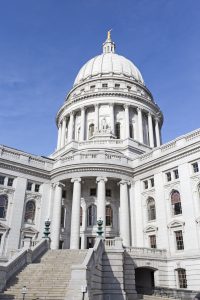by Dan Rossmiller | Jul 9, 2021 | Legislative Update Blog, National Issue
 The Centers for Disease Control and Prevention (CDC) updated its guidance for COVID-19 prevention in schools today (7/9).
The Centers for Disease Control and Prevention (CDC) updated its guidance for COVID-19 prevention in schools today (7/9).
The updated guidance focuses on helping administrators in K-12 schools, along with state and local health officials, safely support in-person learning as well as sports and other extracurricular activities. The updates are based on the latest science and emphasize the COVID-19 prevention strategies most important for K-12 schools to support in-person learning.
(more…)
by Dan Rossmiller | Jun 29, 2021 | Federal Issue, Legislative Update Blog, National Issue, State Issue
 Today the Federal Communications Commission (FCC) opened the initial filing window for the Emergency Connectivity Fund, a $7.17 billion federal program that will help schools and libraries provide the technology tools and services their students and communities need for remote learning during the COVID-19 emergency period.
Today the Federal Communications Commission (FCC) opened the initial filing window for the Emergency Connectivity Fund, a $7.17 billion federal program that will help schools and libraries provide the technology tools and services their students and communities need for remote learning during the COVID-19 emergency period.
From June 29, 2021 to August 13, 2021 eligible schools and libraries can apply for financial support to purchase connected devices like laptops and tablets, Wi-Fi hotspots, modems, routers, and broadband connectivity for off-campus use by students, school staff, and library patrons.
(more…)
by Dan Rossmiller | Jun 16, 2021 | Federal Issue, Legislative Update Blog, National Issue
 As we reported in an earlier post, the American Rescue Plan Act (ARPA) enacted by Congress in March 2021 provides $7.1 billion for the Federal Communications Commission (FCC) to create an Emergency Connectivity Fund Program to help schools and libraries purchase eligible laptop and tablet computers, Wi-Fi hotspots, modems, routers and broadband connectivity for students, school staff, and library patrons who would otherwise lack connected devices and/or broadband connections sufficient to fully engage in remote learning. (more…)
As we reported in an earlier post, the American Rescue Plan Act (ARPA) enacted by Congress in March 2021 provides $7.1 billion for the Federal Communications Commission (FCC) to create an Emergency Connectivity Fund Program to help schools and libraries purchase eligible laptop and tablet computers, Wi-Fi hotspots, modems, routers and broadband connectivity for students, school staff, and library patrons who would otherwise lack connected devices and/or broadband connections sufficient to fully engage in remote learning. (more…)
by Dan Rossmiller | May 20, 2021 | Legislative Update Blog, National Issue, State Issue
 A pair of companion bills aimed at barring male-to-female transgender athletes from competing as girls in interscholastic sports are moving forward. Two separate public hearings have been scheduled for next Wednesday morning (5/26). The Assembly Committee on Education will take public testimony on Assembly Bill 196 at 9:00 a.m. in room 412 East of the State Capitol and the Senate Committee on Human Services, Children & Families will hear on Senate Bill 322 at 11:00 a.m. in room 411 South of the State Capitol.
A pair of companion bills aimed at barring male-to-female transgender athletes from competing as girls in interscholastic sports are moving forward. Two separate public hearings have been scheduled for next Wednesday morning (5/26). The Assembly Committee on Education will take public testimony on Assembly Bill 196 at 9:00 a.m. in room 412 East of the State Capitol and the Senate Committee on Human Services, Children & Families will hear on Senate Bill 322 at 11:00 a.m. in room 411 South of the State Capitol.
For years, the Wisconsin Interscholastic Athletic Association (WIAA) has established and enforced policies regulating student participation in high school athletics for school districts around the state. (more…)
by Dan Rossmiller | May 11, 2021 | Legislative Update Blog, National Issue
The federal Food and Drug Administration yesterday (5/10) granted Pfizer’s request to authorize the use of its COVID-19 vaccine to children ages 12-15. This follows the FDA’s action earlier this year approving emergency use authorization of the Pfizer vaccine for adolescents ages 16-17. Thus far, the Pfizer vaccine is the only vaccine to have been approved for those under age 18.
The new emergency use authorization of the Pfizer vaccine opens the possibility of vaccinations to millions of children nationwide, including roughly 300,000 in Wisconsin. Infectious disease experts believe vaccination is an important step for increasing immunity in the population and preventing new variants from gaining a bigger foothold. (more…)
by Chris Kulow | Mar 31, 2021 | Legislative Update Blog, National Issue
From NSBA National Connection:
ABC News (3/30) reports a study released Tuesday by the Secret Service’s National Threat Assessment Center suggests “targeted violence against schools is preventable, if the warning signs are identified.” The report “studied 67 thwarted school violence plots and 100 plotters to come up with a framework to further prevent school attacks.” The agency determined there were “several consistent factors in attacks that were prevented and attacks that happened, such as a history of discipline or law enforcement interaction, if the plotter had experienced bullying or had underlying mental health issues, intended to commit suicide or had been impacted by childhood conditions.” The Secret Service also “found that 45% of the attacks planned, but not carried out, were based on a grievance with a classmate,” and that “15% of potential attackers wanted to kill.” (more…)
 The Centers for Disease Control and Prevention (CDC) updated its guidance for COVID-19 prevention in schools today (7/9).
The Centers for Disease Control and Prevention (CDC) updated its guidance for COVID-19 prevention in schools today (7/9). Today the Federal Communications Commission (FCC) opened the initial filing window for the Emergency Connectivity Fund, a $7.17 billion federal program that will help schools and libraries provide the technology tools and services their students and communities need for remote learning during the COVID-19 emergency period.
Today the Federal Communications Commission (FCC) opened the initial filing window for the Emergency Connectivity Fund, a $7.17 billion federal program that will help schools and libraries provide the technology tools and services their students and communities need for remote learning during the COVID-19 emergency period.  A pair of companion bills aimed at barring male-to-female transgender athletes from competing as girls in interscholastic sports are moving forward. Two separate public hearings have been scheduled for next Wednesday morning (5/26). The Assembly Committee on Education will take public testimony on
A pair of companion bills aimed at barring male-to-female transgender athletes from competing as girls in interscholastic sports are moving forward. Two separate public hearings have been scheduled for next Wednesday morning (5/26). The Assembly Committee on Education will take public testimony on